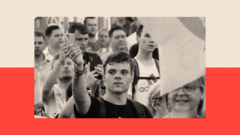In a small bar situated in the former mining town of Freiberg, Saxony, 19-year-old Nick reveals his longing for a peaceful country devoid of fear, echoing sentiments shared among his peers. Nick and his friend Dominic, 30, are supporters of the Alternative für Deutschland (AfD), reflecting a broader trend observed in Germany where young men are increasingly gravitating towards far-right ideologies, particularly amid rising anxieties triggered by national and global events.
As Germany prepares for its national elections, political tensions mount. The AfD’s growing influence is noteworthy, with the party consistently polling as one of Germany’s top choices. The recent spate of violence involving asylum seekers has intensified concerns among many young German men like Nick and Dominic. They express support for immigration only from those who demonstrate integration—cautioning against perceived exploitation of the asylum system, an issue they feel is often misconstrued as xenophobic.
Research by Pew in 2024 indicates that 26% of German men harbor positive views of the AfD—a stark contrast to 11% of women. This gender disparity has grown alongside rising anxiety levels in young people. The far-right narrative has found fertile ground in social media's bypassing of traditional news outlets, particularly platforms like TikTok where AfD has cultivated a significant following.
Social media's role cannot be overstated. Many young supporters, such as Celina Brychcy, a 25-year-old TikTok influencer, use the platform to disseminate content embracing the AfD’s ideals. While she engages in lifestyle content, her posts advocating for stricter immigration laws resonate with many of her viewers, 53% of whom are male aged between 18 and 35. Celina contends that her beliefs stem from a need for societal change rather than a rejection of multiculturalism.
This shift towards the far-right also ties into a resurgence of traditional gender roles, notably among young men who express a desire for a return to conservative values. Many youths speak of perceived threats to traditional masculinity and quickly reject what they call "gender ideology," often implying a desire for a return to historic norms within family structures.
Concerns about historical memory fade with each passing year; teachers like Diana Schwitalla face increasing instances of Holocaust denial and troubling attitudes towards Germany's past in classrooms. Such sentiments permeate the youth culture and contribute to the normalization of far-right ideologies. As young men embrace harsher rhetoric about immigration and national pride, experts warn of a lingering potential volatility as these ideologies seep deeper into societal acceptance.
While traditional parties stand firm against collaboration with the AfD, political analysts speculate that should the right-wing narrative continue to gain traction, we may soon witness a significant shift in the landscape of European politics. The AfD is working diligently to reshape its image and distance itself from the "far-right" label—aiming instead for recognition as a conservative alternative.
In this era of political realignment, it’s essential to monitor the shifting sentiments among Germany’s youth and be cautious of the potential implications for democratic norms and social cohesion in a country that remains vigilant of its historical burdens.




















